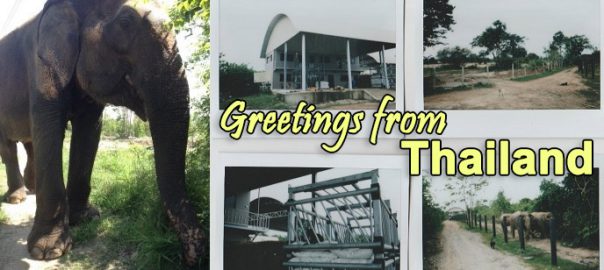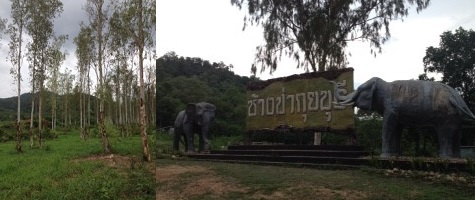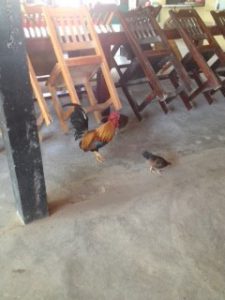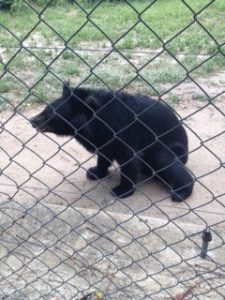Different volunteers are assigned to different elephants every day. Different elephants reside in four different areas (e.g. Centre, Midlands, Newlands, and Elephant Hospital). Elephant husbandry is hard work so we are usually split into several groups of a team leader and a few volunteers. Husbandry tasks for each area differ a little, and the schedule is mostly the same. Basically, we feed them several times a day along with enrichment activities, clean ups, baths, and walks. We do projects and harvesting as well. We have fertilized growing trees with elephant poo a few times!
Anyways, I got lucky to work with my two favorite elephants named Malai and Chok Dee several times. They reside in the hospital area as you can see from the Polaroid photographs. These elephants have opposing personalities and it was quite a sight to behold. The elephant in the closeup picture is Malai. Her name means ‘The Lady’, which is befitting for her. She is gentle and mellow, perhaps one of the most laidback elephants I have come across. She takes her sweet time to savor every moment on her own terms. She took her medicated banana balls with grace. Chok Dee, on the other hand, is the funny glutton and her name means ‘Good Luck’. She is the only elephant that would eat bananas and fruits only, not banana balls and tamarind balls, and eats the fastest compared to others. She is smart enough to detect medications and refuse to eat anything with them inside. We once tried to feed her with banana balls with smashed meds, but she dropped them uninterested. Then, we tried to trick her by feeding her bananas with meds embedded into them. She ate them, but spit the meds out. We were dismayed but determined that with some good luck, Chok Dee will accept medications one day.
According to the textbook on elephant biology and medicine, wild elephants have been known to consume more than 100 different species of plants but are generally poor digesters (Fowler and Mikota, 2006). Tamarind has been known to help aid digestion along with mineral salt. However, elephants find them too sour alone so it helps to warp tamarind balls within banana balls, which is a lot like packing medicated pill pockets for dogs and cats. Chok Dee is old but healthy and knows her food. For safety, we had mahouts (e.g. elephant handlers) keeping an eye on elephants and controlling them with verbal commands in Thai so they do not hurt us as we perform husbandry tasks within their enclosures. It has been amazing learning about such regal elephants.
Click here to learn more about Study Abroad programs available at SPC.




 Jarred up awake by an international jet landing firmly, I scoped the window and was greeted by the dark sky lightened up by the bright lights of Bangkok. I checked my digital watch, reading that it was around 2am. Instantly excited and nervous, I wondered how to navigate around in the airport and retrieve my tiny vintage suitcase without making a fool of myself just because I do not know Thai. Fortunately, it turned out to be easy because signs everywhere are also in English. Furthermore, an attentive flight attendant assisted me in filling out paperwork so I could pass through the passport control area and retrieved my suitcase without trouble. Feeling triumphed and relaxed, I eagerly went to the meeting point and awaited the SPC group upon their arrival at 8am. There, I killed time by reading and taking naps on comfy seats without seat handles. Lulled by a dispersing flow of the walking crowd and the glowing glimmer of sunrise, I savored every moment. Eventually, I realized that it was way past 8am and the group did not arrive. At this point, my cell phone was not connected to Wi-Fi because I could not read Thai. We were supposed to embark on a 3-hour trip to the Wildlife Friends Foundation Thailand (WFFT) by 9am. Panicked, I went to the help desk and consulted the public computer to no avail. Luckily, next to the help desk, I saw a dark-skinned man with a sign with my name and one other name on it.
Jarred up awake by an international jet landing firmly, I scoped the window and was greeted by the dark sky lightened up by the bright lights of Bangkok. I checked my digital watch, reading that it was around 2am. Instantly excited and nervous, I wondered how to navigate around in the airport and retrieve my tiny vintage suitcase without making a fool of myself just because I do not know Thai. Fortunately, it turned out to be easy because signs everywhere are also in English. Furthermore, an attentive flight attendant assisted me in filling out paperwork so I could pass through the passport control area and retrieved my suitcase without trouble. Feeling triumphed and relaxed, I eagerly went to the meeting point and awaited the SPC group upon their arrival at 8am. There, I killed time by reading and taking naps on comfy seats without seat handles. Lulled by a dispersing flow of the walking crowd and the glowing glimmer of sunrise, I savored every moment. Eventually, I realized that it was way past 8am and the group did not arrive. At this point, my cell phone was not connected to Wi-Fi because I could not read Thai. We were supposed to embark on a 3-hour trip to the Wildlife Friends Foundation Thailand (WFFT) by 9am. Panicked, I went to the help desk and consulted the public computer to no avail. Luckily, next to the help desk, I saw a dark-skinned man with a sign with my name and one other name on it. 
